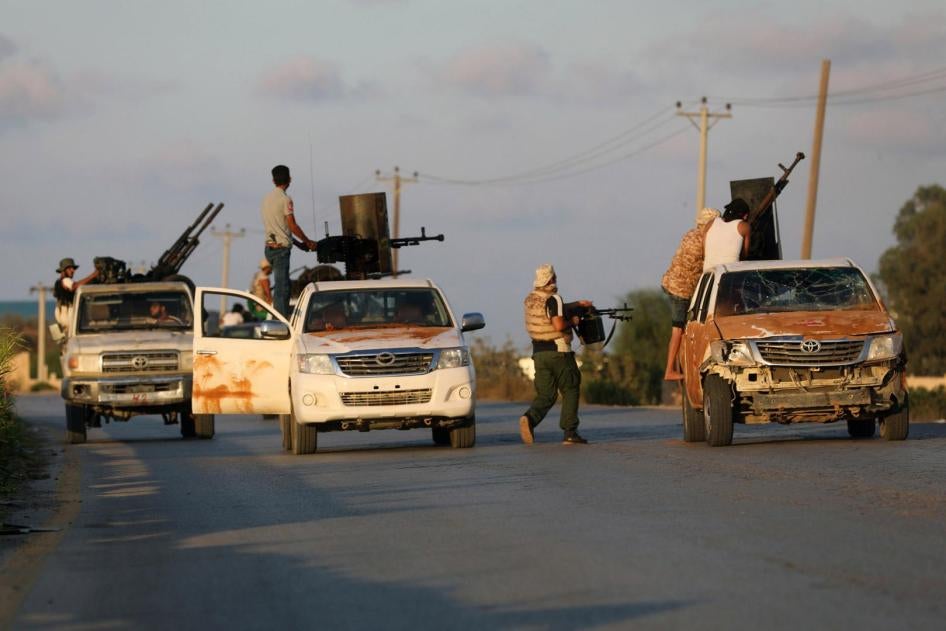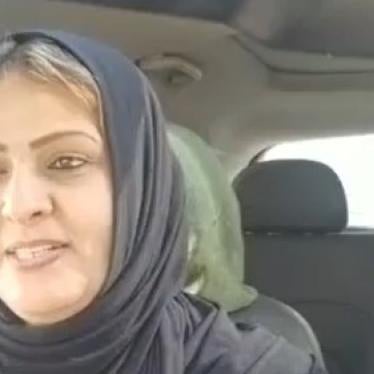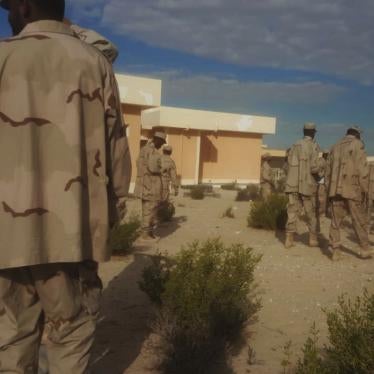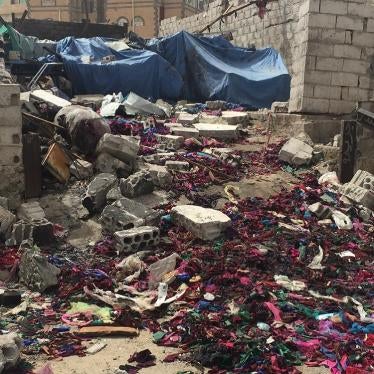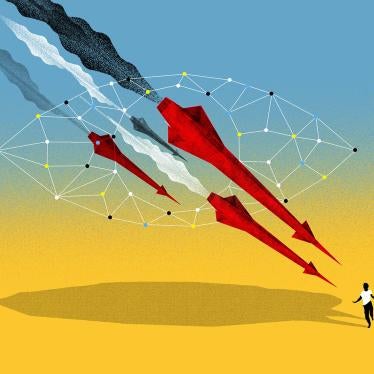On October 20, 2011, a Libyan revolutionary commander from Misrata called me jubilantly to break the news personally that Muammar Gaddafi, Libya’s long-time dictator, had finally been caught by rebel fighters near the coastal city of Sirte, his hometown. With a feeling of trepidation, I recall saying to him, “I hope they don’t kill him.” I believed it was important to see justice done for the crimes Gaddafi had committed. There was silence on the other end.
Some hours later, the first footage of Muammar Gaddafi’s lifeless and half-naked corpse appeared on television. He had been brutalized and lynched by a mob. With him, in the makeshift morgue, was the body of his son, al-Mutassim, who had been captured alive and executed that same day in Sirte by a separate armed group.
In the years afterward, I often remembered that day as the day the barrier of fear that separated the ruling elite from everyone else was broken. It was also a sign that killing with impunity would become normalized in Libya; this was no longer reserved for the brutal dictator’s death squads. Now, anyone with a gun can kill with impunity.
In one of the latest incidents, Hanan Al-Barassi, an outspoken critic of violations by armed groups in eastern Libya that included allegations of widespread corruption and sexual assault, was shot dead on November 10, 2020, in Benghazi by unidentified masked gunmen. She was in a shop on a busy street, in broad daylight. There was a brief period of calm after Gaddafi’s death, but since law and order started to break down in 2012, countless killings have gone unpunished.
Tentative Peace
Governance remains split between two entities in Libya. The United Nations-recognized Tripoli-based Government of National Accord (GNA) is supported by armed groups in western Libya, a region that is nominally under its control. Turkey and Qatar support the GNA with arms, ammunition, training, and foreign fighters. The GNA’s rival is the Interim Government, which is affiliated with the armed group, the Libyan Arab Armed Forces (LAAF), under the command of General Khalifa Hiftar. The LAAF, backed by Russia, the United Arab Emirates (UAE), and Egypt, also relies on foreign fighters for support. Military support to conflict parties is in violation of the 2011 UN arms embargo on Libya.
After a 14-month war that lasted from April 2019 to June 2020, a country-wide ceasefire agreement was signed on 23 October. The United Nations Mission in Libya is currently leading a reconciliation process with a Libya Political Dialogue Forum (LPDF) to negotiate a new governance structure and future national elections. The forum has 75 participants hand-picked by the UN mission in Libya to represent different constituencies, although not all ethnic or social groups are represented. The political dialogue builds on a previous framework from December 2015 during UN-led peace talks on Libya in Skhirat, Morocco.
For now, the gunfire has abated, and some form of negotiation is underway. However, the fragility of the situation cannot be overstated. Local actors are dependent on foreign governments and private military companies, which are playing out their own proxy conflicts in Libya. There are thousands of foreign fighters on both sides of the conflict from Syria, Sudan, and Chad.
Analysts say that the military build-up on both sides continues and the parties could return to active fighting with the smallest perceived provocation. Despite a ceasefire agreement and an arms embargo, training and exercises, including training by foreign forces, continue on both sides.
A Brutal Decade
There were intermittent armed conflicts in different parts of the country since the end of the 2011 revolution. The fighting that began in April 2019 was accompanied by human rights violations and abuses by all sides – armed groups and government entities alike. The international media focus in recent months has been on violations of the laws of war, given that the armed conflict was in and around Tripoli. These include unlawful air- and drone strikes and indiscriminate shelling that killed civilians, unlawful executions and desecration of bodies, and the destruction of civilian structures. Human Rights Watch also identified extensive use of internationally prohibited anti-personnel landmines and booby traps, and some use of cluster bombs by the LAAF and affiliated forces.
Systematic and widespread human rights violations, including forced displacement of tens of thousands of civilians, long-term arbitrary detention, and thousands of politically motivated assassinations, have been ongoing since 2011.
The years between 2012 and 2014 were particularly bloody. There were near-daily assassinations in eastern Libya of politicians, former members of the armed forces, activists, judges, and prosecutors, which may amount to a crime against humanity. A report prepared by a Libyan parliamentary committee listed 643 individual killings in 2013 alone.
Assailants often remain unidentified and local authorities fail to investigate and prosecute their crimes. In 2014, Human Rights Watch tracked at least 250 politically motivated assassinations in eastern Libya, including the killings of Tawfik Bensaud and Sami Elkawafi - aged 18 and 19, respectively - by unidentified assailants in September 2014 in Benghazi. Also in 2014, Salwa Bugaighis, a renowned Libyan human rights lawyer and activist, was shot dead in her Benghazi home in June 2014, by unidentified assailants. Fariha al-Barkawi, a former member of Parliament, and Salwa Yunis al-Hinaid, a former Gaddafi official, were both killed in the eastern city of Derna by unidentified assailants in separate incidents.
What all these cases have in common is that the assailants remained unidentified and local authorities failed to investigate and prosecute these crimes. The lack of leadership to put an end to the gruesome killings permeates all levels of law enforcement. Political divisions and a turbulent security situation since 2012 have undermined the ability of authorities to investigate and issue arrest warrants. Moreover, military commanders and officials in positions of power were frequently implicated in abuses, and were therefore less likely to show interest in investigations.
The Crux of the Problem
I find it totally unacceptable that international partners that hold sway in Libya, including key United Nations Security Council members - the United States, France, Italy, the UK, and Russia - have not prioritized sanctioning individuals for human rights violations for many years, and thereby taken accountability off the table. What incentive is there to stop the killings?
The message currently received by those who commit serious abuses, such as unlawful killings, torture, and forced disappearances, is that they are untouchable. This feeling has been shared not only by the many militias in Libya with a hybrid self-assumed mandate of defense and law enforcement, but also by common gangs, armed to the teeth, and the many human smugglers and traffickers responsible for the misery and inhumane situation of migrants, asylum seekers and refugees.
Senior commanders and high-ranking civilian officials in both east and west stood by as gross violations were being committed in their areas of control over many years, seeming not to care that their failure to act to put an end to abuses could result in their criminal prosecution for complicity in war crimes and crimes against humanity.
I often wonder if something could have been done early on in the transitional phase - after the end of the revolution and around the time of elections in 2012 - that may have changed the course of a country from the brink of implosion to a country in which the rule of law had a chance to prevail. It is safe to say that those who had supported Gaddafi’s overthrow - including France, the US, and the UK - did not treat building respect for the rule of law as a priority, which would have required creating a justice system that would ensure that those responsible for the worst crimes were tried fairly.
I have heard many justifications over the years from Libyan interlocutors that it is unfair to compare the lynching and assassination of Gaddafi to any of the crimes that had taken place during his rule because they were “individual acts” of desperate people. Whenever I brought it up, officials and diplomats told me that of all the issues the National Transitional Council had to deal with in 2011, bringing Gaddafi’s killers to justice was simply not a priority.
Those same justifications for abusive behavior and serious crimes kept on coming up year after year as the revolutionary fighters of 2011 turned into abusive militias. No one gets to claim the moral high ground in a situation in which there is zero cost for killings, torture, forced displacement, enforced disappearances, and other atrocities.
Domestic courts, plagued by political divisions and armed conflict, are, in many areas, barely functional; their procedures have been hampered by grave due process violations. In some areas in the east and the south, the criminal justice system has collapsed. Since 2011, only a handful of cases involving people accused of serious crimes have been adjudicated, such as the trial against former Gaddafi officials that started in 2015, which sentenced eight to death, and the 2018 trial relating to the ambush and killing of 146 anti-Gaddafi protesters in the Abu Saleem area of Tripoli, which sentenced 45 to death. However, in these and other trials that took place, Human Rights Watch found grave due process violations, including forced confessions, ill-treatment, and lack of access to lawyers.
Existing international accountability mechanisms remain limited in scope and effectiveness. The International Criminal Court (ICC) has had a mandate to investigate war crimes, crimes against humanity, and genocide in Libya since 2011. Yet, the court has only issued a handful of arrest warrants; including one against Mahmoud al-Werfalli, a special forces commander in eastern Libya who is allied with the LAAF and Hiftar. The other outstanding arrest warrants are against a former Gaddafi official, Al-Tuhami Khalid, for his role in the 2011 revolution, and Saif al-Islam, Gaddafi’s son, also for crimes committed in the campaign to suppress the revolution. They are both at large.
A UN Fact-Finding Mission on Libya recently established by the UN Human Rights Council has a mandate to investigate serious violations in Libya since 2016. Due to the prevailing situation and global Covid-19 limitations, the mission has not fully set up its secretariat.
The international community has failed to use long-standing UN sanctions, particularly against individuals who have committed serious human rights violations since the 2011 revolution. The UN Security Council-mandated Sanctions Committee for Libya has listed only eight people for individual targeted sanctions - two militia commanders and six individuals accused of trafficking. Given the few listings despite the length of its mandate, it is fair to say the Libya sanctions regime has failed to deter violations.
Although there are allegations of corruption and vote-buying, there is some hope for progress with the Libya Political Dialogue Forum, whose members are currently negotiating a governance framework and future elections. If they succeed in moving beyond this phase, then the members need to ensure that robust accountability measures are a top priority for any incoming interim authority. The recently published roadmap, "For the Preparatory Phase of a Comprehensive Solution", agreed upon by the forum and facilitated by the United Nations in November in Tunis, inadequately addresses the devastating human rights and humanitarian toll after 15 months of reckless fighting.
The plan states support for a “national reconciliation process based on the principles of transitional justice and promoting the culture of amnesty and tolerance in parallel with truth-seeking and reparation.” But it does not unequivocally call for justice and accountability for serious crimes and does not exclude amnesties for serious crimes. As it stands, the lack of justice provisions will impede a durable peace.
Ending the status quo requires political will and strong leadership (to counter the often-cited false narrative that justice gets in the way of peace). This will not be a quick process and it will depend on many factors such as decisions by local or foreign parties on whether to restart the fighting. What’s needed is more courage from the United Nations Security Council members and Libyan authorities to undo the normalization of crime and to raise the cost for unlawful killing in Libya.

